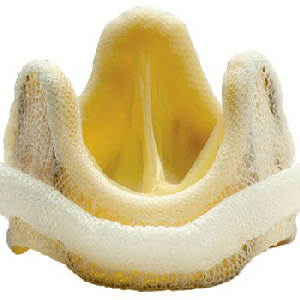Scientists of Samara State Aerospace University (SSAU) have developed a method for assessing the quality of the heart valves, manufactured in artificial conditions, which can increase the acceptance of cardiac implants in the body to almost 100%. It is based on the study of the implant (biomatrix) by use of the method of Raman spectroscopy.
A faint laser beam effects on the biomatrix. Light scattering occurs in the sample under this influence with shifts in the wavenumbers, the values of which are determined by its constituents (collagen, elastane, donor cells, glycosaminoglycans, proteins). We obtain the data array processed by a program coded in Mathematica system for the analysis of composition and purity of the test sample of heart valve.
“With the help of optics and spectroscopy, we have developed a methodology for optical quality control of a product. At the same time we get results in five minutes, and the examination sample is not subject to change and can be used as intended”, - underlined Elena Timchenko, Deputy Scientific Supervisor of the Scientific Research Laboratory “Tissue Engineering”, Assistant Professor of SSAU Department of Laser and Bioengineering Systems.
According to the World Health Organization, cardiovascular diseases today are the main cause of people death. One of the ways to extend the life of a man is to replace, if necessary, the “problem” heart valves with mechanical or biological prostheses. According to experts, about 4 thousand valves are replaced in Russian cardiology centres every year.
Thereat biological artificial heart valves and implants are good as far as they form the blood flow structure close to natural. They are obtained by the tissue engineering method. A valve matrix purified from cells is fully recolonized by the patient's own cells, which minimizes the risk of the valve rejection by the body and the risk of thrombosis. Donor heart valves obtained from a human or animal, deprived of cellular antigens to reduce their immunogenicity are used as a matrix. An example is the technology developed in the Cardiovascular Surgery Clinic of Heinrich Heine University of Düsseldorf.
The problem is that the “purity” of produced valve, which directly affects its acceptance level, is being checked now by biochemical, histological and cytological analyses. These tests require a significant amount of time and damage the test object. The diagnostic method for cardiac implants on the basis of Raman spectroscopy, used by SSAU scientists doesn’t have these defects.
Its reliability has been proved many times by analysis of bone implants that are successfully produced and used in Samara State Medical University (SSMU). Donor bone tissue is purified here from the donor cells by ultrasound, irradiation and chemical treatment and only biomatrix remains consisting of collagen, mineral carriers and intercellular substance. Collagen facilitates to make a bone union during transplantation. This is obtained due to the fact that collagen is chemically and physically close to a patient's body and the implant does not contain donor’s cells. Thus the body does not reject the replanted foreign element. Cells- the patient’s osteoblasts and osteoclasts grow into a new frame, forming a single surface with the rest of the bone.
Furthermore, developments of SSAU scientists are used not only to monitor the bone implants “purity”, but also to improve their production technology. “We have introduced optical coefficient, showing which type of processing leaves less cellular component. And it has helped SSMU medical workers to optimize bone implants processing technology”- told Elena Timchenko.
In the end, the joint work of the scientists from three universities - Düsseldorf, SSMU and Samara Aerospace University on improving the manufacturing technology of heart valve implants, will lead to the fact that cardiac implants made by German technology will be commercially produced not only in Düsseldorf, but also in Samara.
 RU
RU  EN
EN  CN
CN  ES
ES 